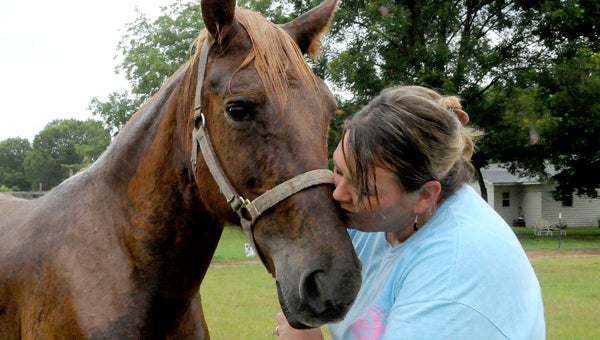Growing concern in area horses affected by disease
Published 4:39 pm Thursday, July 4, 2013

Jeannie Smiley, who said she loves her horses like children, grooms her horse Lady Red in her yard Wednesday. After losing two horses last summer to Easter Equine Encephelitis, Smiley said she does not take any chances with her horses and vaccinates them every six months. Seven horses died of the same disease last year in a five-mile radius of Smiley’s home. –Ashley Johnson
Jeannie Smiley said watching her horses die slowly from paralysis and inflammation in their brains was the most pitiful site she had ever seen.
“I cried when they died like they were my children,” Smiley said about their deaths last July to one of the most aggressive diseases known to horses, Eastern Equine Encephalitis.
She, along with seven other horse owners in Dallas County, lost horses to the disease — an amount so high the State Public Health Veterinarian came to assess the area as high risk and to investigate the area by taking samples.
This summer, veterinarians and the state health department are urging horse owners to vaccinate their horses, especially in Dallas County.
Smiley said she would tell any horse owner who didn’t think it was necessary to vaccinate their horse, that it is not worth losing the horse after all of the money and time invested in caring for them.
“Seeing what those horses went through — that is why it is so important to get them vaccinated, because it is a painful, agonizing disease that you would not want to watch horses, or anyone, go through,” Smiley said. “It’s like Russian Roulette — what mosquitoes land on them. You never know if they will get the disease or not because the mosquitoes contract it from birds they bite. All of that time and money you put into the horses — you don’t want something like this to happen.”
Smiley first noticed something was wrong when her 15-month-old foal April when she could only walk in one direction. Her gait changed and she wobbled.
April also did something called head pressing, where she would press the top of her head against the stall door.
Dr. Frances Kendrick of Valley Creek Veterinary Hospital, who treated Smiley’s horses, said this is a common symptom of the disease, because the horse is trying to alleviate the pressure from all of the fluid and inflammation around their brain.
“We had a horse come to the clinic last year and it had to lean against the stall to stand up, it was sweating profusely and it was pressing its head against the stall to get rid of the pain,” Kendrick said. “The horse came in on Monday and was dead by Wednesday. That’s how quickly this affects a horse.”
Smiley said her horse died within days. Weeks later, her other horse Midnight began to stagger, lose its gait and finally collapsed. The disease and its paralysis of the muscles had taken over.
“What is really sad is that every year we see multiple horse deaths from encephalitis because people won’t vaccinate and the vaccination is relatively inexpensive,” Kendrick said.
She said the vaccinations are close to $30 once a year. For horses in high risk areas and for horses older than 15-years-old, she recommends vaccinations twice a year.
“We are seeing all insects like horse flies, that carry other types of horse diseases,” Kendrick said. “We are seeing all types of flies and mosquitoes, and even fleas and ticks. This has been a terrible parasite and insect year for pets.”
Kendrick said the area where Smiley’s horses are located, near a swamp on Alabama Highway 14 in the Selfield area, is a high-risk area. Many of the horses lost last year to the disease were from that area.
Smiley, like other horse owners who have lost horses to the disease, said she now has her horses on a schedule for their vaccinations twice a year because of the swampy area where she lives in Selfield.
“I have two horses now and I won’t let anything happen to them,” Smiley said.





